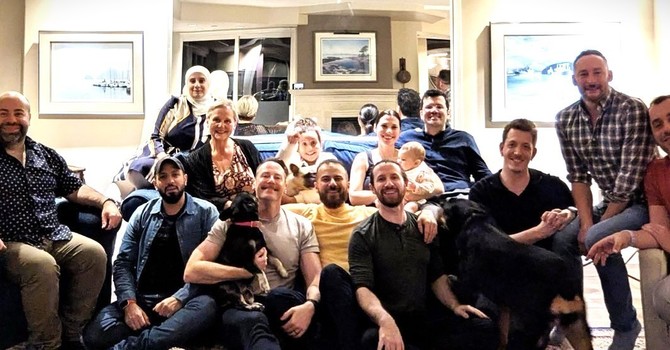
It is May 22nd, 2012. And it’s the first time in twenty-seven years that I’ve forgotten to mark the day as an anniversary of my husband’s death.
Italy! Here I am in Tuscany living the life I’ve dreamed as a writer. I’ve stayed true to my intention to write every morning while I am here and I have pages to prove it. But today the writing does not flow as it has for the past several days. I cannot find the rhythm.
I give in to the impulse to leave the table where I’m struggling to write, walk out the kitchen door, through the wisteria draped loggia, down the stone pathway, through the blue gate and find myself knocking on Monica’s door. The moment she sees me, she puts the coffee on.
“Let’s talk, shall we?” she says.
“Yes, please. I’m going crazy today.”
“Tell me,” she invites.
Bach is playing in the background. The beauty of my new friend’s presence in her home infuses my agitation. Monica, the matron of this traditional Tuscan farmhouse and a highly accomplished painter, feels the same affinity for me as I do for her. This place is inspiring! Casa del Pozza is divided into two units. The owners, Monica and Stefano, live in the main house and rent the second part, which is attached with its own entrance and garden. They’ve had a long love affair with the restoration project of this house, and consider themselves sacred stewards of the property.
Monica knows something of art and grief. I can feel it in her. There is a depth of wisdom drawing me nearer to her and by consequence, drawing me deeper into myself. When I tell her all I want in my life is time and space to write, she says this simply is not true.
“You need the whole of your life or there is no juiciness,” she says. “Because human life has imperfections. The woundedness is all tangled up with the gifts.” Then she paints a picture of Bach in my mind.
With her, I see him in his musical genius hunched over a kitchen table composing music while children run through the house and the daily work of living circulates around him. He does not exclude his family from his endeavour and Monica can hear the life of his life in his music. His creativity had no bounds. It was the centre and circumference of his existence. And now he is in Monica’s kitchen hovering over and through the coffee and conversation between us! Casa del Pozzo is enspirited and I am more alive within its walls than I’ve ever felt before.
Monica is a woman who has borne great loss. Her son, Mats, died in his twenties. She tells me the story of her son who went through a brief period in his life when he needed to be free from her. She understands why now, but didn’t then. Monica’s son eventually returned to her, but then he became ill. She wonders why she couldn’t have kept him longer. “But he died,” she says. “He knew everything when he left. There was a great smile in the room and so much love.”
She shares the intimate details of what it was to mother her son and what it taught her. “So that you may learn,” she says. “My son left for two years and I had to let him have his freedom, to grow. He pushed against me and I didn’t know why. And then when he was sick, he became my guru. When he died, I slipped into a kind of glass bubble to manage, to cope, to bear. It’s a way to stay with the higher, the greater, and not allow myself to go back to the lower or lesser place. I many times wonder why I couldn’t see then what I see now. We know everything as soon as we are here in the glass bubble. And there is no linear time, in this place where we know everything.”
I relate to her idea of the glass bubble because I lived in one for a long while when my husband was killed. The shock of his death propelled me into an altered state and I never did return to who I was before he died.
“When I started to paint again after my son died, the change in me was reflected in the way of painting. All the seeking, seeking, seeking turned into a kind of making order on the canvas. To not stay in the pain, we must use it to grow. As women we can do the home-making for ourselves without needing to be martyrs, and also show up for our art, in balance. There needs to be a balance to maintain health. A kind of order to our life. This is why I love Bach. Listening to his music puts order back into my life.”
“It is our salvation,” Monica says.
“And when the writing is hard, don’t struggle,” she says. “Just leave it. No thinking. Be easy. Don’t believe artists who say they love it all the time. Most of it is angst and when it’s hard, that’s okay. Walk away and then come back. Process.”
It seems to me that all I’ve ever wanted is the balanced life I had on the farm as a child with my parents, brothers, and sister. The freedom to work and to play in the wholeness of a life that anchored us to a place, a community, and the simplest of pleasures. I’ve been trying to capture the essence of it — safety. And without safety it is difficult, if not impossible, to sit down and write.
Monica knows the value of regularly showing up for one’s art. She says she can tell when I’ve had a good writing session because I get that far-off look in my eyes, like I’ve been visiting another world. When she invites me into her studio, I witness the way she works. There is so much beauty here! Everything pulsates with a quality of light I’ve not known before. It reminds me of the quality of sound on the prairie where I grew up. Unless you’ve experienced it, it’s almost impossible to describe. Prairie sound is empty of sound, so deep and resonate you can feel the weight of it in your body, while at the same time you sense your own expansion into something so vast it encompasses all of life. It makes you feel massive and minuscule at the same time. Home on the prairie, it is the space that fills me with sound. Here in Italy, it is the beauty tuning me to the landscape.
When our coffee cups are empty and the sun is low over the horizon, I understand I couldn’t write today because I am bored by the victim story of widowhood that has taken up so much of my life, and it threatens to take over the writing. If I see myself as a victim then I have to think that I’ve done something wrong and I absolutely know that this isn’t true. Nothing has gone wrong in my life! So surely, I have new stories to tell.
Monica is right. The work of my life, the whole of my life, can be my salvation. My desire to stay inside the creative process is my desire to be rooted in life – my life. For salvation is ultimately self elevation — moving beyond the victim story and into new creative potential.
Question for Reflection:
What hidden beliefs do I still harbour that keep me feeling like a victim of my circumstances? Am I willing to see the truth, release the nonsense, and claim true potential for myself?
Magdalen Bowyer
Contact Me



